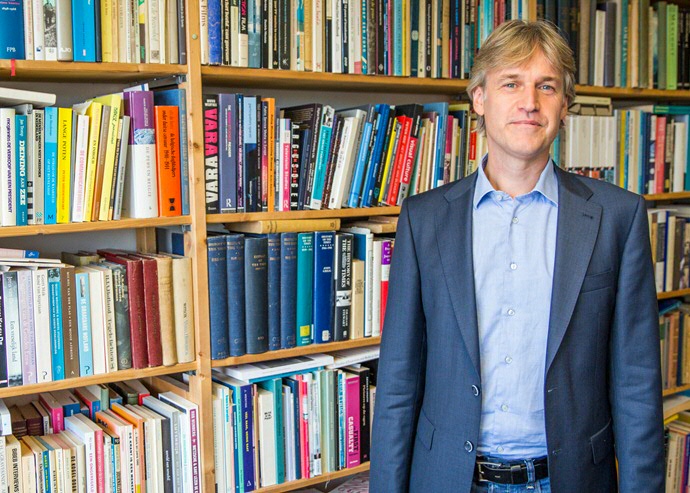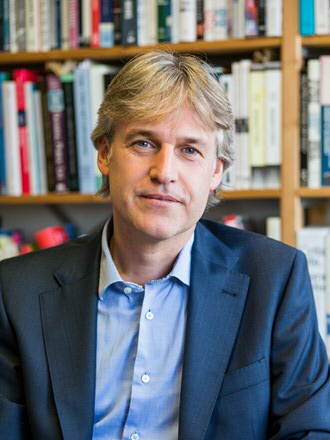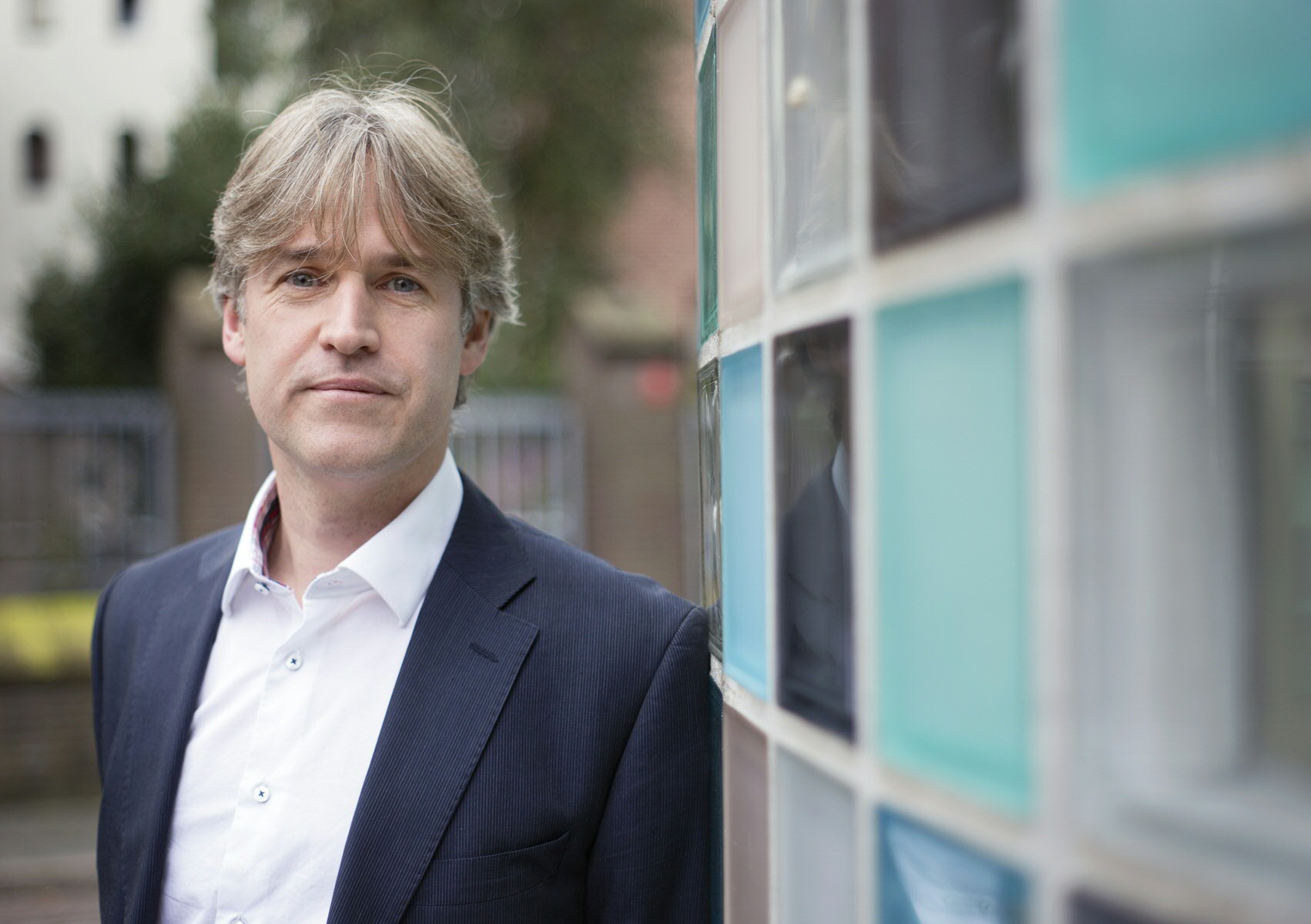The future is digital, but are you?

Many years ago, Marcel Broersma analysed old, yellowed newsprint for his PhD research on the history of the Leeuwarder Courant newspaper. Since then, digitalization has caused his research to shift to social media, new forms of media use and machine learning. When asked about his mission, the Professor of Media and Journalism Studies replied: to prepare Groningen’s society for a digital future.
Text: Riepko Buikema, UG Communication, photographs: Elodie Burrillon
It is a funny contrast: in a setting of metres-long wooden scaffolding, packed with books from floor to ceiling, Marcel Broersma discusses digitalization for one hour straight. In doing so, he uses terms like Digital Society, Digideal, Digital Literacy Coalition, Digital Humanities and Digital Inclusiveness. Not without reason, Broersma asserts. Digitalization is changing nearly all of the patterns in our daily lives: our contact with the government, the way we work, our daily news consumption and how we communicate with friends and family. This has a great impact on our society.
Motor for progress and source of trouble
‘The question is what the exact influence of digitalization will be’ , says Broersma. ‘We don't really know yet. On the one hand, digitalizationand big data are a motor, for improving healthcare for instance, possibly allowing us to identify diseases before they even manifest themselves in a person. At the same time, however, digitalization is causing all sorts of problems in terms of privacy or health insurance. It is an important social issue, which is what makes it so academically appealing as well.’
Impending digital divide

As the national Citizenship & Democracy project leader in the Digital Society research programme, Broersma explores the influence of digitalization on citizenship and democracy. ‘It is very handy to be able to fill out an online form today instead of having to queue up in your town hall, or to use social media to report a full waste container. It does raise the question, however, of what it means for citizens if their government is becoming fully digital. Many people will be left behind because they lack digital skills. They won't be able to fill out their tax returns or reach the municipal authorities, they may make mistakes when applying for benefits or miss out on benefits altogether because they don't understand the forms. ’
Binding agent
The Groningen Digital Literacy Coalition was formed to prevent a digital divide. Together with Iris Vis, UG Dean of Industry Relations, Broersma is trying to bring together initiatives in digital literacy and study their effects. ‘This is done in collaboration with 17 partners: childcare centres, primary and secondary schools, institutions of senior secondary vocational education (MBO), universities of applied sciences (HBO), universities, the Municipality and Province of Groningen, libraries and companies that have all taken the necessary initiatives. A good example is a joint project with the Stichting Kinderopvang Stad Groningen childcare organization, in which we study how children use social media and smartphones to discover the world and orientate themselves. We are also studying social media as a binding agent. How can digitalization improve communication between schools, childcare centres, parents and sports clubs? They too are forever caught, however, between progress and the adverse side-effects of that progress. ’
Dominant
As a father, Broersma experiences the potential dangers of social media on a daily basis. ‘Social media can be very divisive. This is a growing problem in schools and after-school childcare centres. Looking at my own children, social media is becoming rather dominant even in the final two years of primary school. It really is a social phenomenon: who can join which WhatsApp group, who leaves the group and in what way, shall we create parallel groups? These are important themes for children at that age, because they are still figuring out how to treat each other.’

Digital humanities
For older generations and highly educated people, there is a world to win in terms of digital skills as well, says Broersma. ‘Just look at our own Faculty of Arts. Many people still rely on books as their foremost study material, but traditional humanities such as literature, archaeology, history and media studies will increasingly become digitized. We will be needing digital skills to improve the quality of our research. In addition, we will have to study the impact of digitalization and Big Data on society. That was an important reason for designing our new Master's tracks in Datafication and Digital Literacy and Social Media and Society, which will start on 1 September 2019.’
Everyone +1
Groningen even aims to be the most digitally literate city in the Netherlands by 2025. This is the ambition laid down in the new Groningen Agreement, in which Hanze University of Applied Sciences, the UMCG, the Municipality of Groningen, the Province of Groningen and the UG undertake to prepare the city for a digital future. ‘So much is happening in our region. Groningen truly is a digital city. We have a strong IT sector, and there is a lot of attention for digital skills in education. Now is the time to bring initiatives together and to find out which projects are successful. The benefit would be huge if we succeeded in increasing the potential of Groningen's society as a whole. It would allow people to better participate, make them more future proof and provide us all with a better economic perspective. Everyone +1. I think that is a very good aim.’
More information
-
Contact: Marcel Broersma
-
VSNU (Association of Universities in the Netherlands): Digital Society and Citizenship & Democracy
-
The new Master's track: Social Media and Society
More news
-
14 February 2026
Tumor gone, but where are the words?
-
19 January 2026
Digitization can leave disadvantaged citizens in the lurch
